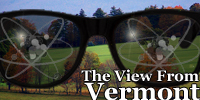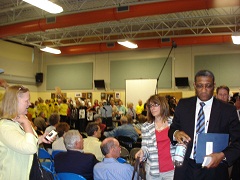The Search For Nuclear Happiness
 This year, and especially during these long tomato-filled days of August, I have been thinking a lot about happiness. Actually, I have been thinking even more about unhappiness.
This year, and especially during these long tomato-filled days of August, I have been thinking a lot about happiness. Actually, I have been thinking even more about unhappiness.
I am a nuclear advocate, and sometimes I find myself thinking, Why am I doing this nuclear activism thing? Do I like confrontation? Do I like it when I get a hate email?
Do I like to go to contentious Nuclear Regulatory Commission meetings where the NRC people are intimidated into leaving the room? Or to Vermont State Nuclear Advisory Panel meetings where opponents ask endless questions about nuclear safety? The answer is no. I don't like to go to such meetings!
On a recent day, I found myself reading The Happiness Project by Gretchen Rubin. My daughter had recommended this book. As I was reading it, I was also receiving a series of accusatory emails from a plant opponent.
Quite a contrast in mental tone.
Not a contrast
Actually, it was not that much of a contrast. One of the points of The Happiness Project is that happiness doesn't necessarily make you FEEL happy. This contradictory statement can be parsed as follows: The activities that are meaningful to a person, and lead to long-term happiness, are often stressful, hard, and anxiety-producing while they are happening. At the time you are doing them, happiness-producing activities do not necessarily make you feel happy.
Gretchen gave a simple example of how she began to discover this. A friend who is a gourmet cook was giving a dinner party. As he dashed around the kitchen, trying to do too many things at once, Gretchen asked him if he was "enjoying his own party?" He paused only briefly and answered that he would "enjoy it when it was over."
So, why does he give the party? I mean, how is "enjoying it when it is over" different from "enjoying it by not doing it at all"? The answer is that cooking for friends is a major source of satisfaction for this man. The short-term stress of cooking leads to the long-term happiness of friendship and cheerful memories. It also leads to the happiness of being admired for the gourmet meals he creates.
I don't want to try to summarize the book here, but it made me think about how to stay happy as a nuclear advocate. I came up with three ideas that work for me, and I thought I would share them.
Three routes to happiness as a nuclear advocate
First: Do something
Try to do something most days, even if it seems small. As Gretchen Rubin writes: We overestimate what we can accomplish in an hour or two, but we underestimate what we can accomplish by small efforts over time. Write enough letters to the editor, and you may be asked to write some op-eds. Once you have some op-eds printed, you can send op-eds to other newspapers and get wider publication. Organize a small meeting, or a big rally. There's always something to do, and it doesn't matter if it is big or small, or if you don't do it perfectly, just as long as you do it.
Second: Work on curing the brownie deficit
Nuclear opponents tend to spend a lot of time together. They have potlucks, make costumes, have coffee and brownies in letter-writing groups. Pro-nuclear people have a brownie deficit; that is, a personal-interaction deficit. Try to cure it! Meet others in person whenever you can. I don't know if I could do much for nuclear energy without the friendship of Howard Shaffer and my husband George Angwin. My female pro-nuclear friends tend to live farther afield, although I have developed a very  close personal and pro-Vermont Yankee friendship with a woman in Brattleboro. It is over an hour's drive between our houses, but we both think that getting together regularly is worthwhile, because personal friendships are important.
close personal and pro-Vermont Yankee friendship with a woman in Brattleboro. It is over an hour's drive between our houses, but we both think that getting together regularly is worthwhile, because personal friendships are important.
Yes, it is hard to get together, but humans were meant to get together. My best ideas don't come from cogitation, they come from conversation. Don't hide behind your computer. Get out there and cure the brownie deficit!
Third: Prioritize
Being a pro-nuclear activist means living in a "target-rich" environment. Every day, somebody will say or plan something ridiculous and anti-nuclear, and you want to answer them all. Every day, someone will ask for your help. You can't do it all. Work on the situations where you have the most knowledge and the most credibility. Usually these are the events and talks that take place near your home. Prioritize! Time is your most precious commodity.
Another way to say that is to quote a friend of mine: "You don't have to join every fight you're invited to."
The General Rule: Gratitude
My rules are specific to nuclear advocates, but I think there's a general rule for increasing happiness that is true for everyone, in every circumstance.
Cultivate gratitude.
As a nuclear advocate, gratitude might mean appreciating your health (so you can be an advocate), appreciating your friends (so you aren't alone in your advocacy), and appreciating your victories, however big or small. However, writing that list just for "nuclear advocates" feels much too petty. Advocate or not, I believe that gratitude helps everyone to happiness, to generosity, and to love.
In other words, being a nuclear advocate is just like being anyone else, and staying happy as a nuclear advocate uses the same techniques as anyone's successful "Happiness Project."
____________________________

Angwin
Meredith Angwin is the founder of Carnot Communications, which helps firms to communicate technical matters. She specialized in mineral chemistry as a graduate student at the University of Chicago. Later, she became a project manager in the geothermal group at the Electric Power Research Institute (EPRI). Then she moved to nuclear energy, becoming a project manager in the EPRI nuclear division. She is an inventor on several patents.
Angwin serves as a commissioner in the Hartford Energy Commission, Hartford, Vt. Angwin is a long-time member of the American Nuclear Society and coordinator of the Energy Education Project. She is a frequent contributor to the ANS Nuclear Cafe.
__________________________


